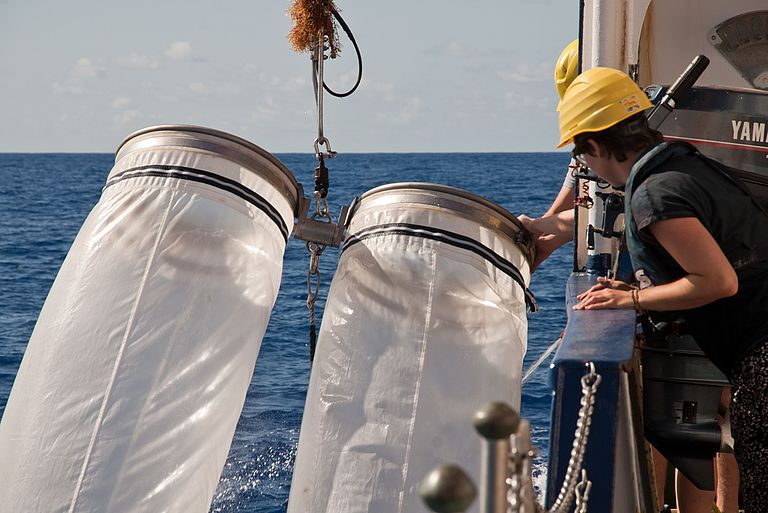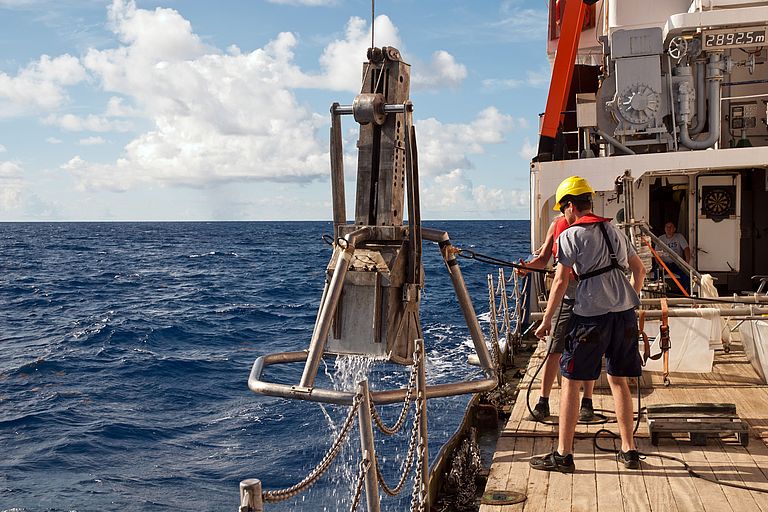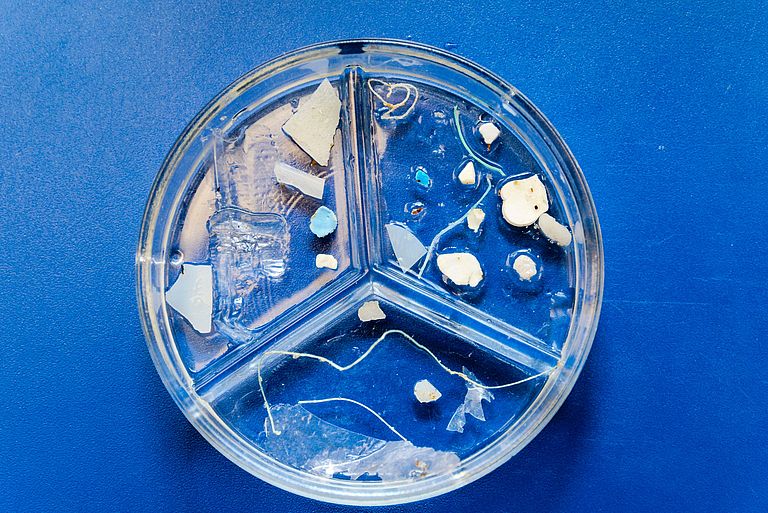A Christmas plastic chase in the North Atlantic
Research vessel SONNE studies the path of plastic waste in the ocean
At the end of November, the German Bundestag passed an amendment to the packaging law prohibiting light plastic bags. Similar initiatives to reduce the amount of plastic waste are now in place worldwide. Nevertheless, several million tons of plastic waste still end up in the ocean every year via rivers and coasts. The final fate of this plastic is largely unknown. “Much less than ten percent of the plastic that ends up in the ocean can currently be traced”, says Dr. Aaron Beck from the GEOMAR Helmholtz Centre for Ocean Research in Kiel.
Dr. Beck is chief scientist of an expedition with the German research vessel SONNE, which will collect data and samples in the central Atlantic over the next four and a half weeks. The interdisciplinary team on board hopes to gain new insights into the fate of the plastic in the ocean and its effects there. The cruise is part of a multidisciplinary initiative to investigate the origin, transport and fate of plastic waste from river mouths to oceanic garbage patches.
“We will visit a total of eight stations. Two of them are located west of France and Spain, covering the presumed route of plastic from the continent to the big garbage patches. The remaining six are located in the central Atlantic Ocean south of the Azores. Here, earlier studies have already demonstrated an increased concentration of plastic particles in seawater,” explains Dr. Beck.
At each station, the team will take water samples from the surface to just above the sea floor, and collect plastic particles throughout the water column with towed nets. They will also pull sediment cores from the seafloor to examine them for plastics. Using towed cameras, the scientists will also check the seabed for large plastic debris and deep sea organisms. “It is also important for us to see which marine biota live there and perhaps interact with the plastic,” explains Dr. Beck. Studies suggest that biology could play an important role in transporting the plastic from the surface to the deep sea.
The results of the expedition will be incorporated into the HOTMIC (HOrizontal and vertical oceanic distribution, transport, and impact of MICroplastics) project, which is funded by the European joint programme initiative “Healthy and Productive Seas and Oceans” (JPI Oceans). This expedition follows a first research cruise on the vessel POSEIDON in August/September 2019, during which the western part of the Atlantic garbage patch was sampled. A second HOTMIC expedition in March 2020 with the research vessel ALKOR examined plastic contamination in coastal seas along western Europe from the Mediterranean to the North Sea.
In addition, the current expedition also provides data and samples for the PLASTISEA project (Harvesting the marine plastisphere for novel cleaning concepts), which is funded by the German Federal Ministry of Education and Research and focuses on potential biodegradation processes of plastics in the sea.
The expedition was approved and organized at very short notice under the current corona regulations. The team was in quarantine since the end of last week before being allowed on board yesterday. “When we were at sea for the second HOTMIC expedition in March, Western Europe was just entering the first corona lockdown,” recalls Dr. Beck, who was also the expedition's chief scientist at that time, “maybe this time it's the other way around and the situation will improve while we are at sea. That would be great”.
In any case, the researchers report on their work at sea in the HOTMIC blog - and certainly also how they spend Christmas and the turn of the year on the SONNE. On January 5, the ship will return to port in Emden.
Participating institutions:
- GEOMAR Helmholtz Centre for Ocean Research Kiel
- Institute for Hydrochemistry of Technische Universität München
- Forschungszentrum Juelich
- University of Ghent (Belgium)
- Università di Pisa (Italy)
- MARE - Marine and Environmental Sciences Centre (Portugal)
- Agência Regional para o Desenvolvimento da Investigação Tecnologia e Inovação (ARDITI) (Portugal)
- Helmholtz-Zentrum Geesthacht Centre for Materials and Coastal Research (HZG)
- NIOZ - Royal Netherlands Institute for Sea Research
- University of Utrecht (Netherlands)
- Germany's National Meteorological Service DWD
The usage of the image material provided with this press release is free for editorial purposes in conjunction with the content of this press release. The image source must be named.




![[Translate to English:] Nach Quarantäne und negativen COVID-19-Tests konnte das Team der Expedition SO279 gestern in Emden an Bord des Forschungsschiffs SONNE gehen. Foto: Isabelle Schulz/JPI Oceans [Translate to English:] Nach Quarantäne und negativen COVID-19-Tests konnte das Team der Expedition SO279 gestern in Emden an Bord des Forschungsschiffs SONNE gehen. Foto: Isabelle Schulz/JPI Oceans](/fileadmin/_processed_/7/c/csm_2020-12-04_SO279_Boarding_IsabelleSchulz-JPIOceans_b91d12616e.jpg)


